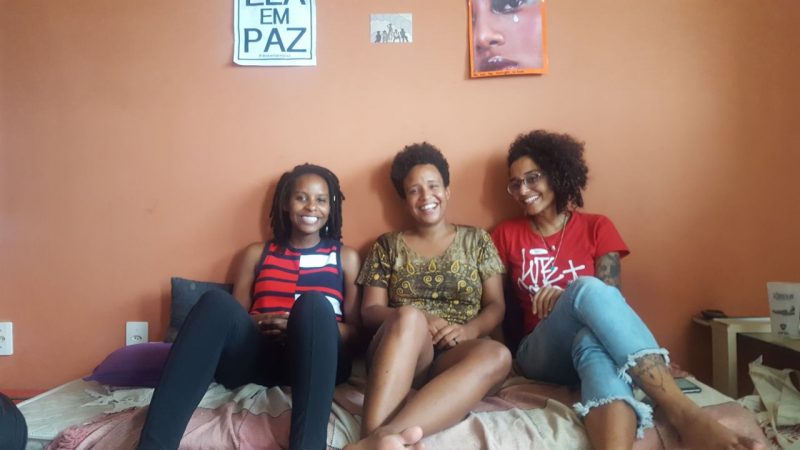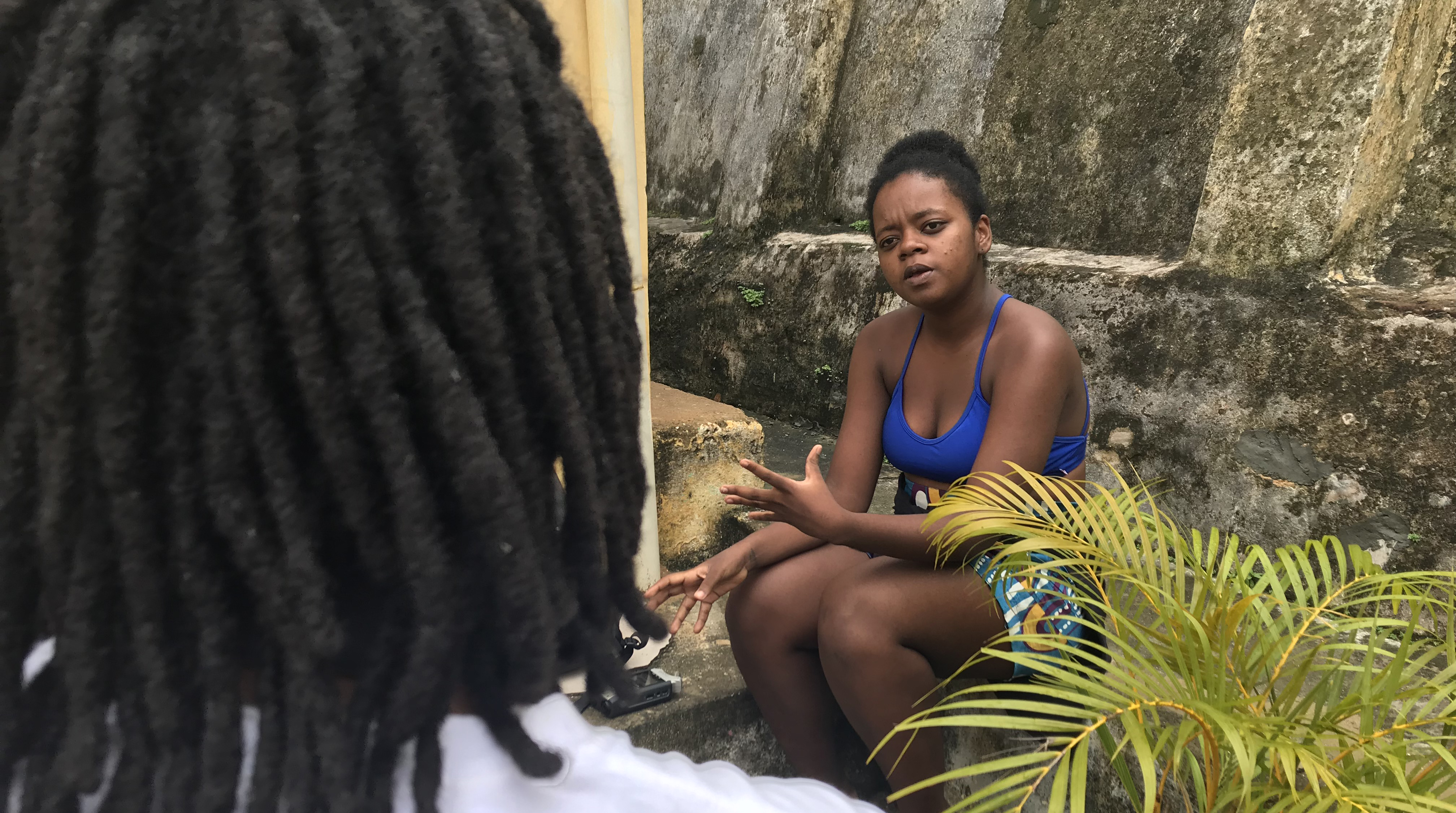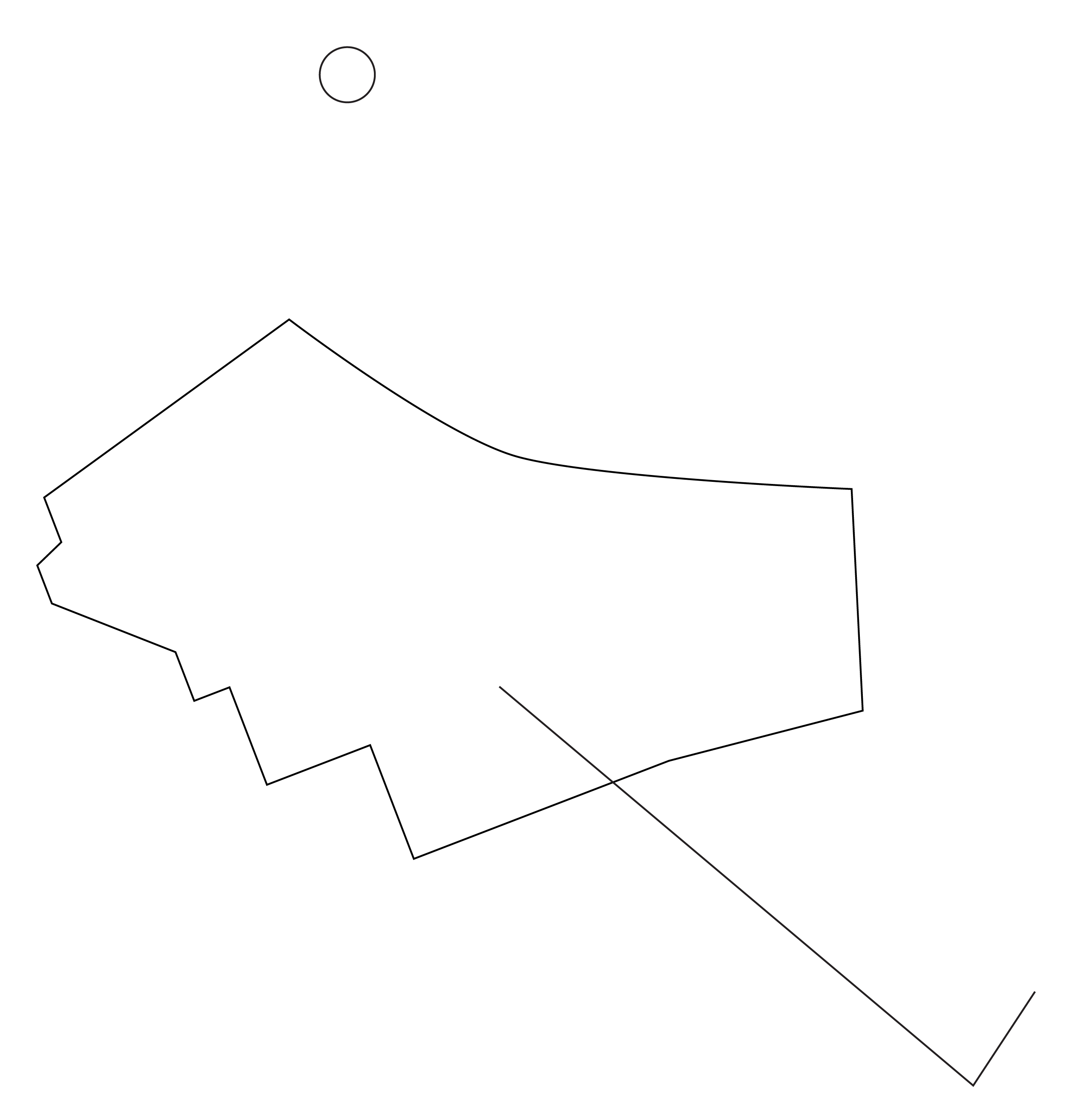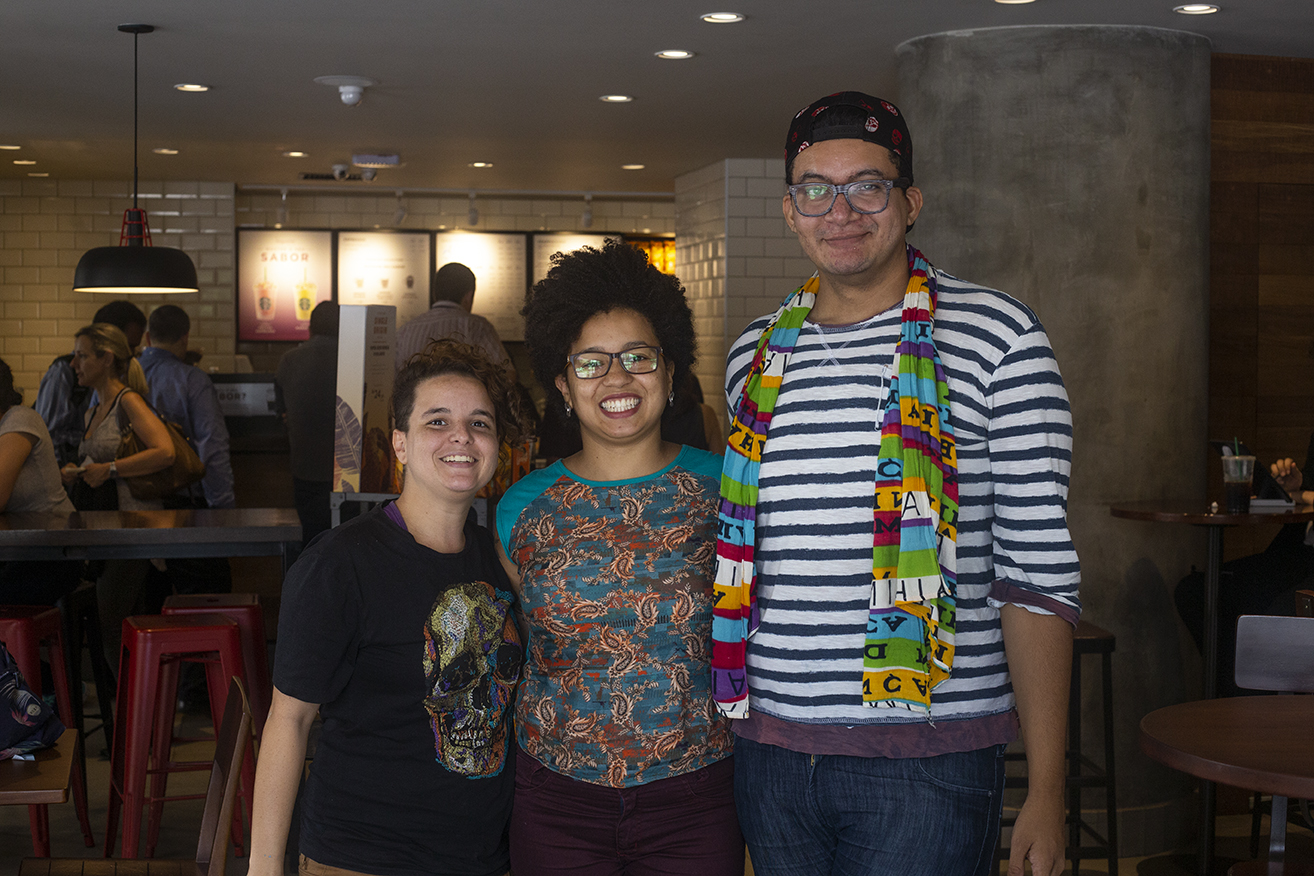Right to memory, education and culture

“Actually I think that the fact that you were born in Brazil, black, poor and in the periphery calls you to a natural obligation to be someone who resists all types of racism. So we are born activists, right?”
Celinha, Belo Horizonte
“I was a different body. Often a body that was snubbed, with jokes aimed at me, do you understand? I was a body that served as a ladder for some students, and things felt heavy, too. Why does this happen? And where was the root of this problem, am I the problem or are those people the problem?”
Naia, Recife
Recovering memory to imagine the future
Black and indigenous enslaved labor built Brazil. The construction of inequalities was part of the development model employed subsequently. Recovering the origins of the people who built the country, recovering memory and ancestry as a part of the process of identity formation is key for imagining the future. The laboratories of rights to memory, education and culture are initiatives that work to guarantee these rights.


“What is politics? And where is the upper middle class? And where is the black population? Is it political when I wake up, open my door and the police, the UPP is out there? And what about that beautiful ocean at Boa Viagem beach that greets the middle class in the morning? So politics happens from the moment you wake up, sleeping, eating, it is all politics. What you eat, how you eat, the conditions that allow you to eat are all politics. Politics is very broad. Our politics is cultural politics, it is politics based on identity, on culture. Social transformation using culture can improve the lives of people and our own lives, too.”
Beth, Recife
“The black, African labor made the country rich in all of the economic cycles since the 16th century. It was in the Northeast with sugar cane, cotton, mineral extraction, the gold-mining cycle in the Center-west, and coffee production in the Southeast…And after, when slavery is abolished, there is no restructuring for this population. If you imagine the Brazilian state without including the black population in this process, then the population ends up without any public policies, without housing, without financial resources, without homes, without work, with nothing.”
Tadeu , São Paulo
Maré Museum
Created by residents and members of social movements in Maré, a favela complex in the North Zone of Rio de Janeiro, the Maré Museum creates actions to register, preserve and inform visitors about the history of the communities that resist there.
The Right to Ancestry
Many initiatives work on the right to memory, education and culture through transdisciplinary projects. They recount the history of Brazil and reveal a lineage that connects each doer with their own history, their past and their future. Ancestry is the link with this history, chiefly for those of African descent. It is oftentimes accessed through a spiritual connection with ancestors and with the collective and individual memories of each person.

“I took him away from his continent, I enslaved him, I took his soul, I took his subjectivity. He is here, with identity, the ethnic identity that makes us eternal. So black people have this capacity, of resignifying, of being in a diaspora, living in that diaspora. That makes the colonizer crazy…”
Ricardo
Memory is history on a timeline, the record and the place. Subjectivity and identity find the historical belonging of each political body through memory. When memory is negated, the political body loses connection with ancestry, identity and belonging. The history of Brazil is told from a Eurocentric and colonizing point of view. The constant erasure of the indigenous, feminine and black histories in the country reveal the importance of the right to memory.
Since rights are guaranteed to only a few, the identity struggle encourages the pursuit of a collective guarantee of these rights. This is carried out in a process of self-recognition as subjects or citizens with a common history. Memory, education and culture in the process of identity construction stimulate the reconstruction of the social fabric.
#recognize #belong
“We are not even in a democratic process, we are still in the process of getting out of colonialism. I have the impression that colonization isn’t over. Do you understand? And as long as we don’t end colonization, we won’t have abolition, we will never reach democracy.”
Tadeu, São Paulo
Political innovation happens in the process of recognizing the importance and value of African, Afro-Brazilian, Indigenous, and other native people’s cultural expressions. Examples of these expressions are Candomblé, Capoeira, museums, orality and diverse historical records.

“Unfortunately the Rui Barbosa trolley burned with all of the documents that could give us the best pathways back to Africa. So all of the documents with records of the Africans who came here robbed of their freedom for forced labor, where they came from, who they were, if they had families, their cities and regions, all registered because of a white, racist political hegemony, were all burned. They burned all of the records of this population and simply erased our history.”
Tadeu, São Paulo
“Community museology surges to break with that, to create a space for a new museology. No one wants to burn down the Louvre, to the contrary, the point is to recognize that there are other ways of working with the concept of museums and what they represent for the general population.”
Luis, Rio de Janeiro
“I also look back today and see how much I missed out not having a family member, friend, or cousin that played Capoeira, practiced Candomblé, that brought me closer to my African roots.”
Álvaro, Belo Horizonte
“Everything that has poor, black origins, that is from our culture, is treated as nothing. This is the challenge, staying united, uniting the family and the community, because without that nothing makes sense.”
Joana, Recife
Maracatu Encanto do Pina
Mestra Joana is a reference in Brazilian popular culture, as she is the first woman to lead a Maracatu nation the size of Encanto do Pina. She also acts directly in the area of women’s empowerment in her territory, inviting young girls to do what they were previously prevented from doing.
Instituto Cultural Samba Autêntico
(Authentic Samba Cultural Institute)

“But actually, working with memory, museology, with museums, is a political act. Very political and militant. So starting the moment that I hear a story, whether it is about the creation of the favela, or of a specific favela, the history of quilombola people or ribeirinho or indigenous people, I will have a different identification with it, I will resignify that space, that history, that territory, I will resignify what I experienced and am experiencing.”
Luis, Rio de Janeiro
“On this question of going back to our origins, we created an institute whose mission is local, cultural and human development through art. We found a warehouse in Cidade Tiradentes and start working on local development there and then we started projects to respond to local needs. The action is always artistic and cultural.”
Adriano, São Paulo
Cultural spaces as spaces of policial education
Cultural spaces are spaces of coexistence, of opportunities, of learning and free training, of identity construction, of subjectivity and of belonging. They are laboratories for freedom of expression, and for practicing and building political activism.


“Our theory of change isn’t theory, it is practice, what we are doing starts right there. There is no theory, it is practice. It is singing côco music, it is grabbing the microphone at the radio station to sing, it is putting on our music, it is building a studio so that people can come in and make something that challenges this very exclusionary phonographic production. Because sometimes a master is born and dies of old age like my dad and others did too never having recorded an album. It is such a basic thing. At the end of the day it is practice. What we really need is less theory and more practices of people transforming the territory, changing the country and changing their lives based on their practices, based on people’s concrete practices.”
Beth, Recife
“The Hip Hop Manifesto was a mobilization process. We went to the streets to do cultural activities, not just to rap, but also to mobilize people for a political discussion around the hip-hop movement, to engage them. This is the differential of hip hop in Minas. We go beyond the logic of the four elements of hip hop – dance, graffiti, DJ and break dancing – and also bring in elements of political discussions around black empowerment, calling for the participation of the black movement in political discussions in the municipality. So we thought about all of that and at that time we created the Youth Forum.”
Russo, Belo Horizonte
“Think the city, discuss the city, discuss spaces for participation, discuss the budget with samba in mind, which a significant part of the São Paulo and Brazilian elite still marginalizes.”
Tadeu , São Paulo
“The politics that we want to build happens between equals, with freedom, specifically with freedom of expression, which is what we are afraid of losing today.”
Adelaide, Recife
“Kalango was reciting a poem that made an allusion to the police. Not saying it directly, but it making a reference. The title of the poem was “Everything that starts with P is no good,” something like that. And he spoke and spoke and you thought he would say police but he didn’t and he just alluded to the police. And a police officer heard this, he was speaking into the microphone and they took him out, searched him, hit him, broke his equipment, the stuff he used for work on the bus, and the organizer of the event didn’t do anything, he saw the repression in front of him and he didn’t do anything, he said it was the police’s job and that we should keep the movement going and not worry about it.”
Adelaide, Recife

Monique Evelle, Patricia Naia and Rebecca França
Slam das Minas
“Everything that I say in poetry, I could say in Congress or the Senate.” – Patricia Naia, Slam das Minas (Recife)
The poet Patrícia Naia, originally from São Paulo, lives in Recife where she is studying literature in the Federal University of Pernambuco (UFPE). A former private school student, in that environment at age 13 she perceived that she was part of a minority and that something was not right. “And then I started to write,” she remembers. And she filled notebooks with her writings, typed them onto the computer and then published them on a blog.
“Something came to me about writing literature for women, and opening more and more space where women can access literature and share what they write,” she remembers. In August of 2017, she got together with another friend to organize an edition of the São Paulo Slam das Minas in Recife.
Slam das Minas, the first poetry competition in Recife led by women, exceeded expectations. More than 300 people showed up in the center of the city. The challenge now is going out to where the girls that participated live, in the peripheries, to write poetry with them and seek effective transformation. Verses are Patrícia’s political tool. “We have a cry inside us and nowhere to yell,” she said.

Adelaide Santos
Recital Boca no Trombone
Adelaide Santos, 20, is in the street working for change. It was echoes of poetry that first called her to the street.
After four years participating in theater and African dance classes, her poet friends introduced her to verses and she fell in love with this medium. Joining verses with already-familiar raps, she began relating marginal poetry to her own reality. She spoke of the problems in her house, in the favela, of her friends who were incarcerated and others who had been assassinated.
Adelaide needed to speak. She started going to Recital Boca no Trombone, an open mic that happens weekly in a plaza in Água Fria, in the north zone of Recife. She learned about the event previously and started to play an active role last year. “That was when I started to pay attention to the genocide of the black population and realized that I needed to do something,” she said. Today, she uses poetry as a tool for the struggle and an expression that can transform reality.
From the crime section to the culture section
Culture has the ability to elaborate and diffuse new ideas and narratives. It supports the resignification of spaces, bodies and expressions, giving us the possibility of occupying spaces where the political imagination hangs by a thread. The peripheral cultural manifestations, which oftentimes occupy public spaces, create new codes and reignite memory and belonging.


“Our challenge is making culture the protagonist because in a place where culture is not the protagonist, violence prevails (…) Our challenge is to have games and cultural activities that can be taken to the streets because the streets already have culture. It is born in the terreiros but materializes in the streets. You have to work on these things out in the territories in a place where culture is not the protagonist, violence prevails.”
Beth, Recife
“At that time, this space was a very negative place in the community imagination because it was a place where people hid murdered corpses, where there was child prostitution, there were drug sale points, no one wanted to come here…I used to avoid passing in front of this space, and when we decided to occupy it, many people told us not to do so because it was dangerous. At the time everyone was really young, we wanted to do things, and we were very courageous. In the beginning, we had to be really flexible, learn to coexist with the people who were already here, who were marginalized. We started to produce events. Culture week, for example, was an entire week of music, theater, audio-visual exhibits, debates, poetry recitations. The event started to grow and we started to articulate with people from other neighborhoods, we got someone to bring a sound system, we started to organize with people and started to gain some visibility. And then Peixinhos, which before only appeared in the crime section of the paper, started to appear in the culture section.”
Daniel, Recife
“A police officer from that area started to crack down on us, saying that he did not want us there anymore, that he would shoot us, a lot of things happened. But we always try to resist. We went to speak with the officers and they understood, now it is a calmer event, every Tuesday we are out there resisting, even more people are joining us now. Violence is the police criminalizing the movement, not the movement itself.”
Adelaide, Recife
“Since I grew up in the Candomblé terreiros, I believe that we have a different education that looks beyond. I was always involved in movements, getting the girls together to do things they told us we couldn’t. And I grew up and my great grandmother, the founder, died. My father took up responsibility for the Maracatu Encanto do Pina and alongside him I dove deeper, becoming ever more active in the organization, the coordination. Then I realized how limited space for women is. Because within Maracatu women didn’t play. You see, I was born and raised in this context and I never realized that I could play Maracatu.”
Mestre Joana, Recife
“To us, theater meant telling true stories about the people from those territories. It was a way to bring people closer to art, so there I was already doing politics. I didn’t know, I thought I was just making art, but I was also doing politics.”
Veruska, Agência de Redes
Rights in Diversity
Brazil is the country that kills the most travestis and transsexuals in the world. In 2016, 127 trans people were killed, which is one murder every three days. The life expectancy is 35 for white trans people and 26 for black trans people, which is less than half the national average life expectancy of 75. Beyond violations to the right to existence, we see that lack of access to education perpetuates trans exclusion.
“It took me a while to understand that 91% of the female travestis in Belo Horizonte had not finished high school. So how can I start a college prep course if 91% haven’t finished high school?”
Duda, Belo Horizonte
Without education, access is granted to punishment rather than to rights
Unequal access to education gives rise to unequal access to justice. The people with the fewest rights in society consequently have little to no access to education. This leads to a lack of understanding of the judicial system. Mothers with incarcerated sons and do not have legal aid, and thus the cycle of inequality is maintained. The judicial system is accessed only to punish and almost never to protect.

“People get crazy sentences, simply because they did not have any defense. Their family members did not understand what was happening with their children and husbands, brothers, whomever, and no one was really able to explain it to them. At university, law students are not trained to translate the law into a language that people can understand.”
Nana, Belo Horizonte
According to research from Gemma, the highest courts are composed of a majority white people (89.9%) with low percentages of black (1.3%) and mixed race (7.6%) people. Because of this, both class and race impact outcomes in the justice system.
Structural racism and the law
Law 10.639/03 has existed for 15 years. It has played a part in the process of construction and recovery of racial identity. The number of people that declare that they are black has grown, contributing to the fight to defend and recover memory. Many teachers refuse to speak about Africa in schools, which upholds institutional racism. Law 11.645 was also passed in 2008, endorsing 10.639 and including the duty to teach the history and culture of indigenous people.
Art. 1 Law 9.394, December 20, 1996, comes into force accompanied by articles 26-A, 79-A and 79-B:
“Art. 26-A. In places of public and private primary and secondary schooling, the teaching of Afro Brazilian History and Culture becomes an obligation.
§ 1o The programmatic content to which the caput of this article refers includes the study of the History of Africa and of Africans, the struggle of the black population in Brazil, Brazilian black culture and black people in the formation of national society, recovering the contribution of black people to the social, economic and political areas that are pertinent to the History of Brazil.
§ 2o The contents that include Afro-Brazilian History and Culture will be ministered throughout the school curriculum, especially in the areas of Artistic Education and Brazilian History and Literature.
“The education that we need does not ignore its roots. We have law 10.639/03. We don’t have education in schools. It is completely outdated, everything is outdated.”
Joana, Recife
Movimentos
Movimentos emerges in 2016, in the North Zone of Rio. Today, it brings together youth from different peripheries across the country who are interested in discussing drug policy from the perspective of those who live the “war on drugs” most intensely.”
Intersectionality is a sociological concept that considers the ways different power structures interact and oppress the people who most suffer from inequalities. Intersectionality is the consequence of different forms of discrimination. In Brazil the intersections of class, gender and skin color are prominent.

“Because beforehand, I was speaking about what it means to be from the periphery. It seems class and territory consciousness came to me long before gender and race. I discovered that I was black late, I always saw myself as a woman, but what are the challenges and problematics of being a black woman from the periphery? I think I hadn’t put that into words before now.”
Jessica, São Paulo
“They took me to a black party in Olinda, a party that the black movement puts on every year called Noite do Cafuné. And there, I experienced a sense of being recognized as black in a positive way and feeling valued for the first time. Black people normally discover that they are black experiencing pain, violence and discrimination. I already knew I was black under those conditions, but that night was the first time that this recognition had beauty and positivity in it. After that night, I got involved in afoxé. I started in the black militant movement not through a specific political organization but because of afoxé. In afoxé, for example, I had direct influence because when I got closer to the group Alafin Oyó the women were in charge, it was the first and probably only women-led period in Alafin’s history.
Thaísa, Recife
Prouni and university access
Prouni, Fies and racial quotas were public programs that were often cited as playing a role in the process of strengthening education in peripheral territories.
Prouni is the University for All Program, which grants full and partial scholarships to private higher education institutions for undergraduate courses and specific training courses. It was created by the Federal Government in 2004 and officialized as Law #11.096 on January 13, 2005. Fies, the Student Financing Fund, grants loans to the students who have partial scholarship to cover the fees that the Prouni scholarship does not cover.
Many of those interviewed under age 30 could go to university with Prouni support, while those over age 30 spoke about the challenges they faced paying for private courses. The majority of the doers, independent of their age, reported being the first in their families to graduate from college.

“Who got a Prouni scholarship? Who joined Science without Borders, left the country, went on an exchange program, gained other points of view and took knowledge with them, too? Who got a My House My Life home, who was able to buy a used car because of low IPI? Whoever got into university made it, man, but whoever couldn’t missed their chance, it is going to be another 50 years before we will be able to organize and establish a society that gives us a crumb of what we constructed, you know?
Tadeu São Paulo
“Standing next to my mother, I became the of first my grandmother’s grandchildren to graduate from college. I am the first from my dad’s family, too.”
João, Belo Horizonte
“There was indigenous travesti who used to live in the streets and had a history of crack use, received electroshock therapy, was institutionalized and everything, and she was accepted to study biological sciences at UFMG. This was the first acceptance at UFMG of an indigenous travesti.”
Duda, Belo Horizonte
“At age 17, I worked eight hours a day, full time, with a contract. It was hard to coordinate this with university studies, because the schedules did not line up. But I didn’t have another choice, because I had to pay half of the university fees. It was at that time that I met people who introduced me to the Prouni financing. My sister got it before I did, which was another blow for me. She and I couldn’t have the scholarship at the same time. She was towards the end of her studies and I had to wait for her to finish for me to continue mine. So I kept working, the first and second semesters I worked until I got the financing from Fies. It wasn’t a lot, but I saw that it was my only out if I wanted to study. Or I studied that way or I didn’t study. So I got Fies financing and went to school.”
Natalie, Belo Horizonte

Luy, Jéssica Cerqueira and Francisco Aldiney
Cursinho Transformação
(Transformation Course)
Think fast: where is the trans population?
Responding to the lack of transgender people, travestis and non-binary people on university committees, a group from PUC (Pontifical Catholic University of São Paulo) got together to give classes and prepare this historically marginalized population to occupy the academy. They were able to form a partnership with with the São Paulo Municipal Diversity Reference Center to pay bus fares and with the Educational Action NGO where they were able to host night classes and cultural actions from Monday to Thursday.
In addition to the training, the Popular Transformation Course is part of a solidarity network that supports LGBTI+ collectives from the peripheries of the city and individuals looking for a place to live after being kicked out of the homes of their families.
For Francisco Aldiney, as long as the state gives no indication of when it will guarantee full rights for trans people, civil society initiatives are important for opening cracks in the system.
Diversity enters the labor market
The political body changes the market when it enters.
It changes politics when it enters.
Bodies change spaces.
There is a politics of the body, it is what defines us as individuals in an unequal society. The body that you have defines who you are, affecting even your ability to participate in politics. The occupation and the presence of oppressed bodies in spaces of power alters the political dynamic. Women, black, LGBTI+, indigenous and low income people experience society in a different way. When they do politics, conscious of their role, they bring other perspectives and needs to laws and public policies.
“We are this all the time, our diversity, our essence, our construction…I don’t have to go to the terriero to pray, to play drums…I am that all the time!”
Ricardo
“The beer company Nó! has a really cool ad. I wonder if it is just a marketing strategy or if there is someone who was a quota student at university and is now inside the company raising this question.”
Bomb, Observatório da Juventude
Lá da Favelinha
The Lá da Favelinha cultural center is an independent space in the Aglomerado da Serra, which spreads literacy and art through Hip Hop Culture.
Bonobando
Coletivo Bonobando brings together artists from various parts of the city of Rio de Janeiro with interventions in the streets, alleys, alleys and also in the conventional theaters. His artistic productions portray his trajectories and relationship with the city, making art and politics walk side by side.

